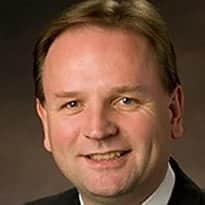Don’t be gun shy of IT – Stevens
- 4 June 2014

Simon Stevens has told the NHS not to be "gun shy" of technology after its experience with the National Programme for IT.
In a brief presentation to the launch of a new Clinical Leaders Network Informatics Forum ahead of its his first speech to the NHS Confederation annual conference, Stevens said that technology would be vital if the NHS was to meet the challenges on it over the next five years.
Stevens, who recently took up the job of chief executive of NHS England after a decade working for the US healthcare giant United Health, said no other industry had met these challenges without adopting IT to radically change its working practices.
"We did manage to make some investments from the debacle of the National Programme for IT," he said. "But because of that we have become a bit gun shy and we need to move forward."
In his main speech to the conference in Liverpool, Stevens outlined a familiar set of challenges for the health service; focused on the gap between funding and demand caused by an ageing population.
His predecessor as chief executive of NHS England, Sir David Nicholson, warned this gap could reach £20 billion by 2015 and £30 billion by 2020 if action was not taken to close it.
He called for a "national conversation" on what a sustainable NHS should look like. But Stevens said there would be no "five year plan" and no further management reorganisations.
He also said that while he supported NHS England medical director Sir Bruce Keogh's call for a reorganisation of acute and emergency services into 40-70 centres, there would be no whole-sale reorganisation of other hospitals.
Instead, he argued that better commissioning, more flexible local services, and the embrace of modern medicine should be seen as the way forward. He indicated that he saw better data as key to improving commissioning; joking that he had visited NHS Liverpool CCG's website to see what information it was giving the public about the challenges that it faced.
He also indicated that technology such as telehealth could help deliver services in new ways. And he gave huge support to the use of big data in the NHS, promoting the care.data initiative at both the CLNIF launch and in his main speech.
Although he acknowledged that the project to link hospital and GP data and give access to researchers and others has run into significant opposition because of its consent model and concerns about who will have access, he told the CLNIF that "done right" it had huge potential.
In his main speech, Stevens announced the start of bidding for hospitals to take part in the 100,000 Genome Project to map the genomes of 100,000 people with rare diseases. This information will be linked to electronic records.
Stevens also stressed the importance of clinical leadership and involving communities and patients in change. The CLNIF has been set up to involve front-line clinicians in debates about how to use tecnology to improve efficiency and safety.
It has grown out of the wider Clinical Leaders Network, which was relaunched in 2007 from a base in Salford. It is free to all clinicians with an interst in NHS reform and leadership issues, and will work with other networks, including the CCIO Leaders Network established by EHI.
Launch chair Dr Masood Nazir said those involved "are convinced that information is important and that getting clinical leadership is essential to make that a reality."
Read a full analysis of the big ideas at this year's NHS Confederation conference in Insight.




